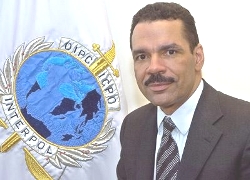Last friends of the dictator
167- 21.08.2012, 15:09

After the torture of the KGB the suspects confess in anything.
Belarus is the last european dictatorship, ruled with an iron moustache by Aleksandr Lukashenka. But it does have one or two friends in the west – not least Ronald K. Noble, the American secretary-general of Interpol.
When a bomb in the Minsk Metro killed 15 in April last year, many feared that this was an attempt by the regime to blacken the name of the pro-democracy opposition. Not so Noble, self-proclaimed “smart guy”.
Forty-eight hours after the bomb, two men, Dima Konovalov and Vlad Kovalev, were arrested by the Almaz anti-terrorist unit, and one month later the Interpol chief turned up in Minsk to praise the “high professionalism” of the Ministry of Interior in solving the case “so quickly”. Noble described Konovalov, the alleged bomber, as a “terrorist” – four months before his trial. The two men were duly convicted and in March this year they were shot.
Enter foghorn-voiced BBC hack John Sweeney, who went undercover to Belarus and met Vlad’s mother. Lyuba Kovaleva said the young men confessed to the bombing only after a night in the torture-centre of the secret police, the KGB. Sweeney reported her claims last week on Newsnight and in a Radio 4 documentary, and indeed in an instant e-book.
Cue fury from Interpol, which attacked Sweeney for “biased speculation” and “false and misleading statements”. The Interpol website put up a documentary about the Minsk bombing produced by Belarus state TV, to show the “strength of evidence obtained during Belarus’s criminal investigation”.
The film raises more questions than it answers, particularly for the Interpol chief who so ardently endorses the regime’s official version. Why is there no DNA evidence linking the suspects with the bomb? No bomb particles? No clear CCTV shot? What the documentary does show, however, is the two men being arrested by the Almaz unit – which was identified as a death-squad in a 2004 Council of Europe report on the disappearance of Lukashenko’s political opponents. If Knacker Noble was arrested by a death-squad, how high would he rate his chances of a fair trial?
And how much does he know about the history and methods of the Belarus State Security Committee, for which Interpol has such a high regard? One common torture at its “isolation unit” (known as the Amerikanka, from a 1920s Chicago prison design) is to make prisoners stand naked, legs akimbo, in sub-zero temperatures.
For his Newsnight film, Sweeney stripped off in a north London freezer (not a pretty sight) but could bear it for no more than 40 seconds. “After five minutes,” he says, “I would have confessed to killing all the Queen’s corgis.” Detainees at the Amerikanka – such as the Metro bombing suspects – are forced to endure it for 40 minutes at a time, after which they too will probably confess to anything. Is this what Interpol means by “high professionalism”?
P.S. You are welcome to participate in a poll on our website: “Should Interpol Secretary General resign over contacts with dictators?”
Results of the poll are being updated every 10 minutes due to caching.










